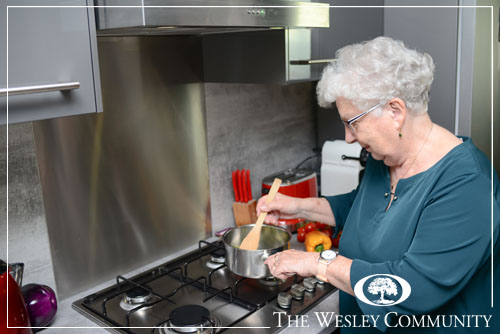If a senior in your life has Alzheimer’ or another form of dementia, these tips can help keep them safe.

Safety concerns are one of the primary challenges caregivers cite as being difficult to manage at home. Alzheimer’s creates unique difficulties that loved ones may not know how to handle when faced with the role of caregiver. From kitchen safety to wandering and medication management, these issues need to be carefully monitored as the disease progresses.
If you are the caregiver for a friend or family member who has Alzheimer’s disease or another type of dementia, these safety tips will be of interest.
How to Keep a Senior with Dementia Safe at Home
- Use GPS technology: It is an unfortunate reality that 3 out of 5 people with Alzheimer’s will wander from home at some point. Being able to locate them quickly is key to their safe return. One way to do that is by purchasing a GPS tracking device. You can choose from a watch or pendant, or even an innersole that fits in a shoe. Many of these GPS devices utilize wireless technology which makes it possible for loved ones to track a senior’s location in real time.
- Conduct a kitchen safety audit: Kitchens can be a safety hazard for everyone, but especially for those who have a memory impairment. Walking away and forgetting about a pan cooking on the stove is a risk that increases as memory loss worsens. Families often want to encourage a senior’s independence as that is linked to slower disease progression. But staying safe while preparing meals can be a challenge. A device called Cook Stop might help. An electronic unit senses when there is an unattended pan on the stove and turns the stove off. Other safety tips include keeping towels, aprons, curtains, and other flammables away from the stovetop. Also checking that sharp knives, chemicals, and other potentially hazardous items are stored safely away from the senior’s reach.
- Manage medications: Another safety consideration is medication management. Seniors with early Alzheimer’s, especially those living alone, can forget to take important medications on a regular basis. Even caregivers can have difficulty following the medication regimen of a loved one. Fortunately, there are several types of electronic pill dispensers that can help. Some even sound an alert and open the designated compartment on the dispenser at the appropriate time.
- Monitor finances: Adults with dementia may develop poor judgment. When combined with forgetfulness, this can make managing financial affairs difficult. Risks can include paying bills twice or neglecting them altogether. Also, falling victim to scams and fraudulent schemes is another safety concern that increases when a loved one has dementia. Depending on the stage of the disease, you may need to monitor a loved one’s accounts online or completely manage all banking and financial matters.
- Assess for fall risks: Alzheimer’s disease and other forms of dementia can cause changes in gait and vision that put an older adult at a high risk for falls. By assessing their home for potential hazards, you can minimize their fall risk. Stair treads, poor lighting, and area rugs are items to look for around the house. Also consider installing sturdy grab bars near the toilet, shower, and bedside. This home fall prevention checklist from the National Council on Aging will help you identify areas of concern.
Dementia Care Options to Consider
Despite your best efforts, you might find yourself struggling to manage a loved one’s care on your own. If you live in the Saratoga Springs area, The Wesley Community can help. We offer options ranging from in-home care to dedicated memory care. Call (518) 587 – 3600 to speak with an experienced team member today!

